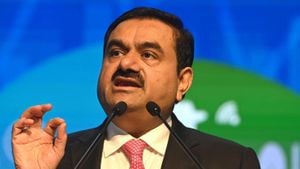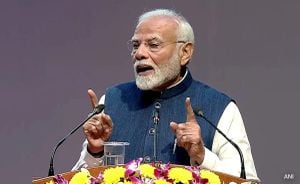Clashes between Israel and Hezbollah have escalated following the expiration of a fragile ceasefire, with both sides exchanging fire and accusations of ceasefire violations. This renewed violence threatens to unravel the peace brokered by the United States and France after months of intense conflict, which saw hostilities flare up dramatically due to the broader regional tensions originating from the Israel-Hamas war.
On Monday, it was reported by the Israeli military and various news outlets, including the Associated Press and CNN, at around 4:00 p.m. local time, Hezbollah targeted two Israeli military posts with projectiles, marking the militant group’s first action since the ceasefire was put in place last week. Israel responded with immediate airstrikes, indicating its willingness to retaliate against what it termed violations of the ceasefire by Hezbollah.
Hezbollah, based in Lebanon, justified its attack as a "defensive and warning response" to repeated Israeli incursions, arguing it was compelled to act following over 50 alleged violations of the ceasefire by Israel during the truce. The projectiles reportedly fell harmlessly in open areas, ensuring there were no reported injuries. Nonetheless, the incident escalated tensions significantly, pointing to the fragile state of the ceasefire.
Israeli Defense Forces (IDF) outlined its operations, mentioning it targeted so-called militant strongholds and infrastructure throughout Lebanon, claiming these strikes were necessary defensive responses to imminent threats posed by Hezbollah. Prime Minister Benjamin Netanyahu emphasized the severity of Hezbollah's actions, asserting they constitute “a serious violation of the ceasefire,” signaling more stringent responses to come if such incidents were to continue.
Since the ceasefire took effect on November 27, there has been uncertainty surrounding its sustainability, exacerbated by conflicting narratives from both sides. Israeli authorities maintained their right to retaliate under the ceasefire agreement, whereas Lebanese officials condemned the 'flagrant violations' occurring throughout the previous days, demanding international intervention.
Lebanese Parliament Speaker Nabih Berri underscored the precariousness of the ceasefire, alleging multiple instances of Israeli strikes, which have collectively resulted in civilian casualties and damage to infrastructure. According to the Lebanese health ministry, these Israeli incursions have led to the deaths of at least four people and numerous injuries since the ceasefire was enacted.
Despite the mounting tension, White House national security spokesman John Kirby stated recently, "Largely speaking, the ceasefire is holding." He noted the drop from dozens of strikes daily to one or two has been significant; this effort reflects the pressures exerted by the international community on both sides to uphold the truce.
Earlier Israeli strikes included drone hit targeting what was described as military vehicles and Hezbollah infrastructure. Tensions between the two factions have been exacerbated since mid-2023 due to conflict spills from the Gaza region, following Hamas's attack on southern Israel which initiated extensive Israeli military actions resulting in massive casualties. Reports estimate over 44,000 Palestinians (the numbers vary depending on the source) have been killed due to Israel's fierce counteroffensive, prompting gains of solidary campaigns from groups like Hezbollah.
The volatile situation on the Lebanon-Israel border demonstrates the broader conflict's potential spillover effect, pulling various regional actors and causing increased uncertainty. While the ceasefire provided initial stability, recent events indicate its potential fragility and the continued risk of escalation.
What happens next remains uncertain. The balance hangs perilously between diplomatic pressure and military action, with local communities bracing for the fallout especially if the peace brokered by international leaders fails.
With both sides entrenched in their positions, the next few weeks are likely to see increased scrutiny and possibly more clashes along the tense, heavily militarized border, as reports from various outlets suggest. The role of neutral mediators will be pivotal, as tensions run high and the stakes for the civilian populations remain critically urgent.
Recent events highlight the importance of continued dialogue amid rising hostilities. The potential humanitarian fallout, especially for the people of southern Lebanon and northern Israel, will require immediate attention and careful diplomatic navigation to avoid another tragic escalation.
The situation calls for immediate relief measures aimed at protecting civilians caught between military strategies. Both Lebanon and Israel have endured long stretches of violence and rebuilding efforts will require more than treaties; they will require sustained actions toward inclusivity and justice for communities devastated by years of conflict.
Israel continues to stand firm on its national security as it vows to protect its borders. Likewise, Hezbollah's rhetoric indicates it will not back down without significant measures taken to quell what they perceive as continuous threats from Israeli military agendas. The interaction along this heavily contested border will be pivotal to watching not just for the prospect of immediate peace, but also for future relations and stability within the borders of both nations.
Monitoring groups remain vigilant as the world watches for indicators of how deeply this latest round of violence will affect both nations' citizens, and what this will mean for the peace efforts pursued by international actors. Any significant hostility, if unchecked, could risk dragging more players back to conflict across this turbulent and historically fraught region.
For the time being, all eyes are on both the diplomatic negotiations and how leaders will respond to pressure from their respective backers, as they seek to navigate the perilous tension of military engagements and ceasefire responsibilities.
A humanitarian perspective cannot be summed up without acknowledging the struggle of civilians living under the massive shadow of armed conflict. Rehabilitation will require more than firepower; it demands dialogue and restoration, urging parties involved to seriously commit to long-lasting peace rather than temporary pauses.



